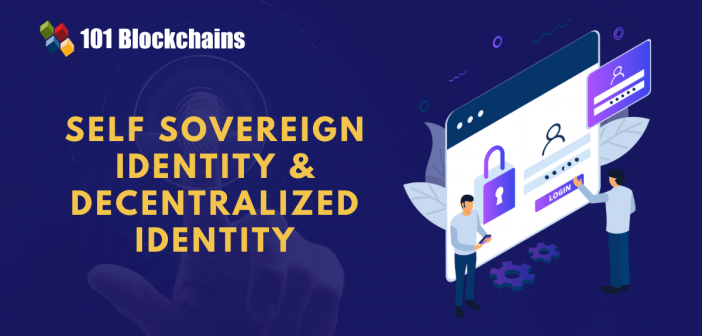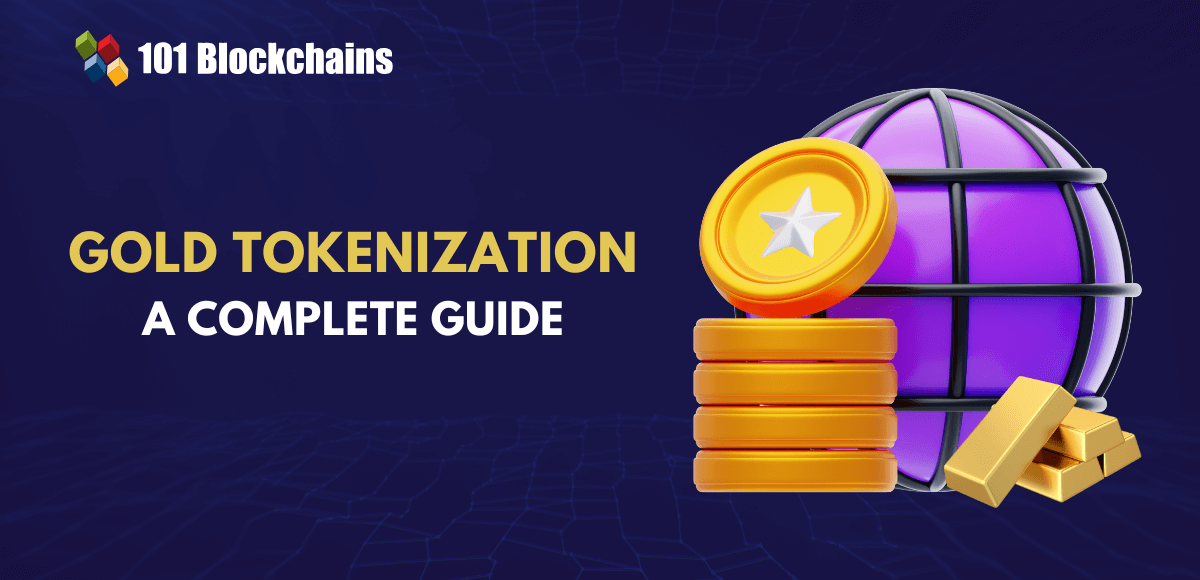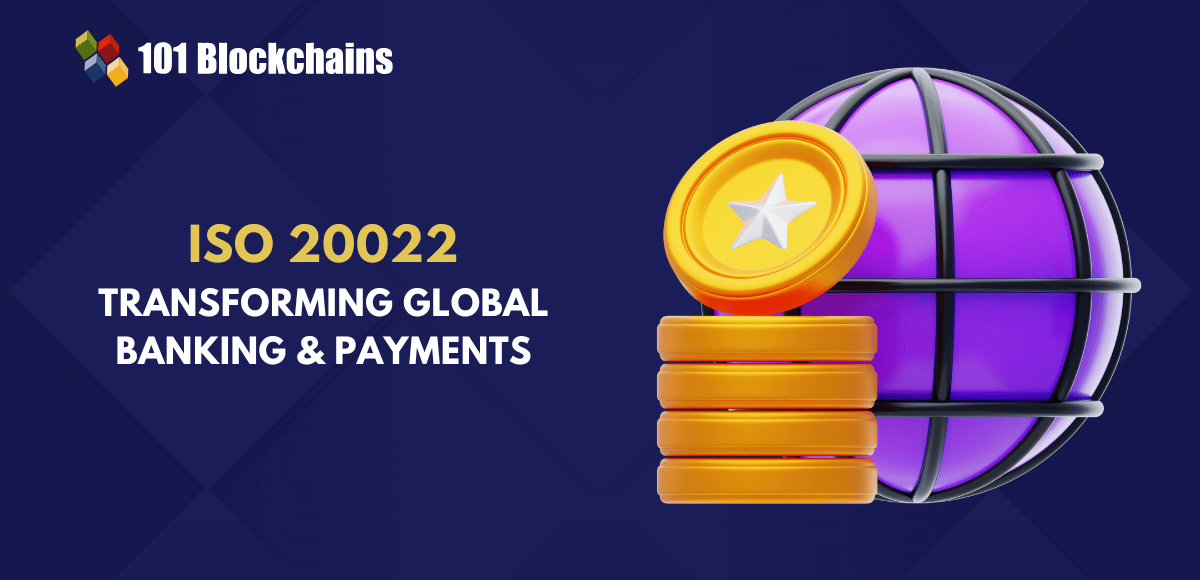Learn how blockchain truly works, master key definitions, and uncover what makes smart contracts so "smart." Dive into the fundamentals, gain valuable insights, and start your blockchain journey today!

- Guides
Georgia Weston
- on July 18, 2022
Self Sovereign Identity & Decentralized Identity – An Unlimited Guide
The thought of the most valuable asset in the digital age does not bring treasure troves to anyone’s mind. It is your digital identity and data. Digital identity is one of the integral highlights in the life of every modern individual. Digital identity basically focuses on offering a digital form of identification, just like real-world ID cards. However, the discussions around Self Sovereign Identity & Decentralized Identity have started gaining momentum in recent times.
The concept of decentralized identity revolves around taking back control of your data, which is critical for your identity and privacy. The following post offers you a complete guide on self-sovereign identity or SSI and decentralized identity. You can explore the critical reflection on existing issues with centralized identity management. At the same time, you can also identify the potential use cases for SSI to learn about its significance.
Want to understand the concept of decentralized identity in detail? Enroll Now in Decentralized Identity Fundamentals Course
Existing State of Identity
Before you try to learn about Self Sovereign identity use cases, you must develop a clear impression of the challenges in the identity ecosystems. Digital transformation has been quite rampant in the recent decade, albeit without any definitive solutions for transferring personal identity to the virtual worlds.
Over the course of time, many issues pertaining to privacy, user experience, data protection, security, and interoperability with respect to digital identity have been addressed on different occasions. On the other hand, it is also important to note the lack of a digital ecosystem featuring sustainable business models alongside suitable incentives for the participating users.
The initiatives for secure and federated digital identities started developing in Europe almost 20 years ago. For example, the European Commission sponsored initiatives such as “Large Scale Pilots” Stork [Ta15] and the Stork 2.0 projects. These projects served an important role in the foundation of eIDAS regulation.
Germany introduced an electronic identity card or nPA to promote the creation of secure digital identities. However, decentralized identity management is still a coveted dream despite the introduction of nPA and eIDAS. Most of the daily use of digital identity revolves around single sign-on systems or username-password applications.
The notable issues for identity ecosystem emerge in the form of the need for creating balanced and sustainable trust relationships among identity providers. Subsequently, the dependent users and parties have also created an important challenge for decentralization. Furthermore, it is also important to find out how many applications are prepared to welcome the applications of decentralized identity.
Build your identity as a certified blockchain expert with 101 Blockchains’ Blockchain Certifications designed to provide enhanced career prospects.
Definition of Decentralized Identity
The understanding of decentralized identity blockchain is one of the significant elements in an introduction to SSI and decentralized identity. Decentralized identity is a unique term described by Microsoft as the path to digital privacy by enabling individuals to take complete control over their privacy. Users could make decisions on the methods and type of data for sharing.
Decentralized identity is also useful in enabling people to monetize their personal information. The applications of decentralized identity can help in reducing the risks of abuse alongside bigger data breaches through violation of people’s privacy. For example, a decentralized identity can help in storing all your academic qualifications digitally and using them for a job interview.
The discussion on decentralized identity management would also emphasize on accuracy of considering it as a centralized, decentralized identity. How is centralization relevant in this case? The individual with the digital identity could act as the central authority over decisions about sharing particular personal information.
Curious to know whether your digital identity is safe and secure? Check the detailed guide on Is Your Digital Identity Safe And Secure!
What is Self-Sovereign Identity?
Self Sovereign Identity & Decentralized Identity are closely related terms, and SSI is frequently used in the case of blockchain-based identity management. Over the course of time, a few key traits of self-sovereign identity have evolved with unique value advantages. The traits show that a self-sovereign identity management system could help users gain complete control over ownership and management of identity without depending on third parties.
As of now, self sovereign identity blockchain systems are not any different from decentralized identities. Self-sovereign identity on a specific blockchain network implies a permanent identity that is accessible completely only by the person or entity owning the identity. However, some portions of the SSI can be showcased to any organization, agency, or individual when the time arises. Self-sovereign identities come with the advantage of encryption and decentralization, thereby reducing the concerns of identity theft.
Difference between SSI and Decentralized Identity
The discussion on SSI and decentralized identity in blockchain systems also point to the possible differences between them. Although there are no specific differences between both terms, they are distinguished on the basis of underlying concepts. Self-Sovereign Identity basically suggests an identity concept that can allow people and businesses to store and control data on their devices.
Users can showcase the data to another individual who wants to verify them without intervention of a centralized database. On the other hand, decentralized identities are a slightly different concept as DID is always under the complete control of the user. With a decentralized identity, you don’t have any certificate authority, central registry, or identity provider. Therefore, you don’t have to showcase your data to anyone to verify data validity.
Want to learn blockchain technology in detail? Enroll Now in Certified Enterprise Blockchain Professional (CEBP) Course
Working of Decentralized Identity
Storing your digital identity in a decentralized form is not the only explanation for how decentralized identity works. The difference between SSI and decentralized identity shows that both the terms imply the same functionalities. You have to understand the technical concepts underlying Self Sovereign Identity & Decentralized Identity before you can identify SSI use cases. The two important technical concepts, Decentralized Identifiers or DIDs and Verifiable Credentials or VCs, are critical requirements for majority of blockchain-based identity approaches. Here is an overview of the two important components in the working of self-sovereign identity.
-
Decentralized Identifiers (DIDs)
Decentralized identifiers or DIDs are basically identifiers you can use for exchanging or authentication of credentials. The ownership of a private key related to the public key embedded in the DID is crucial for proving ownership of the DID. However, the W3C points out that DID is basically the Uniform Resource Identifier or URI.
Some of the other aspects of the decentralized identity blockchain specification refer to the DID scheme and the DID method. The DID scheme is actually the formal syntax for a DID, while the DID method helps in defining the approach for implementation of a particular scheme. You can find information on methods for creating, updating, and deactivating DIDs in the DID method.
Another important element in the working of decentralized identifiers refers to the DID resolver, which returns the DID document for a concerned decentralized identifier. The DID document features the relevant data providing description for the DID subject, including public keys alongside other attributes and metadata.
As of now, the Decentralized Identity Foundation, supported by Microsoft, is working on a universal resolver. The universal resolver can provide the ideal answer to interoperability among different decentralized identity management solutions.
-
Verifiable Credentials
The next significant element in self sovereign identity points at the Verifiable Credentials or VCs. Verifiable Credentials provides a format for credentials, which works as a crucial element across different blockchain-based identity architectures. You can also think of a verified credential as an immutable statement regarding the subject signed cryptographically by the issuer.
Other than the tamper-proof statement, the VC also includes metadata pertaining to cryptographic schemes, issuer, validity period, and other factors. In addition, future applications of Self Sovereign identity blockchain would also call for resolution of challenges, such as including a revocation mechanism.
The revocation mechanism can help in balancing the privacy elements while achieving better revocation. You can also discover different perspectives on concrete implementation of verifiable credentials. However, the fundamental concept of VCs shows that it is a cryptographically signed credential under the control and ownership of the user.
One of the common approaches for managing private keys and credentials points at a wallet application. You also use the application for interacting with other entities and on different devices. The wallets serve as a stable and highly available endpoint for other services and can help in recovering credentials when a wallet is not available on a device. In addition, the concerns of decentralized identity on blockchain networks have also brought forward the use of hardware wallets and paper wallets. These wallets can provide the ideal options for backup and recovery of private keys.
Start learning Blockchain with World’s first Blockchain Skill Paths with quality resources tailored by industry experts Now!
Use Cases of Self Sovereign Identity
The outline of an introductory guide to decentralized identity would be incomplete without reflecting on the self sovereign identity use cases and their valuable benefits. Decentralized identity is the future of identity management as it provides better architecture and improved control for the end-user alongside lesser chances for monopoly. Self-sovereign identity or SSI can grab the market’s attention in the future by a focus on the following use cases.
-
Control to End-User
The foremost value advantage with self sovereign identity & decentralized identity refers to the control over your own data. With the advantage of portability, users can remove their data from the siloes of service providers. In addition, SSI takes away the need to depend on third-party intermediaries for using identity data.
The proposed self-sovereign identity solutions could introduce higher privacy, which would be crucial for decentralized identity management applications. Furthermore, the decentralization and customer-centric nature of SSI would help in reducing the risks pertaining to massive aggregated sets of identity data. The aggregate sets of identity data safeguard against risks of misuse or manipulation and hacks.
On top of it, integration of innovative cryptographic schemes such as zero-knowledge proofs helps in improving safeguards for identity data. You can use verifiable credentials in your digital identity with the flexibility for selective disclosure. As a result, you can disclose only relevant identity data to service providers, thereby enabling better control over your own privacy.
-
Usability
The customer-centric approach is an essential highlight among self sovereign identity use cases, especially in terms of usability. Privacy is one of the key highlights of self sovereign identity and not the complete value proposition associated with the concept. Therefore, SSI solutions must focus on the usability aspects, such as removing the username-password issue.
Single sign-on or logins through existing identity data for accessing new services can help in improving the usability of SSI solutions. On top of it, service providers must also find the self sovereign identity solutions helpful for reducing friction during the process of onboarding customers. Furthermore, access to verified identity data could help in addressing compliance requirements alongside reducing fraud.
Most important of all, service providers wouldn’t have to depend on third-party identity providers or manage the identity information of users. Therefore, service providers can also make the most of usability benefits in self-sovereign identity solutions to avoid risks and costs of infrastructure and security.
Announcement – Decentralized Identity Fundamentals Course Launched, Explore to understand the concept of decentralized identity
-
Accessibility to Digital Identity
The most crucial use case of self sovereign identity blockchain applications would point to improved accessibility to decentralized identity. Decentralized identity can open up the digital identity infrastructure to more than a billion people worldwide. For example, decentralized identity can serve a radically transformative role by offering valid identity information to people who could not access basic societal or financial services.
Some of the notable initiatives focused on digital identities include the Identification for Development Initiative by the World Bank and the ID2020 Alliance. In addition, many proofs of concept projects have showcased the capability of blockchain-based management in enabling better access to digital identity. For example, the World Food Programme or WFP has employed a blockchain-based identity system in refugee camps with positive results.
Start learning Blockchain with World’s first Blockchain Skill Paths with quality resources tailored by industry experts Now!
Final Words
The final overview regarding Self Sovereign Identity & Decentralized Identity suggests that they are the future of identity management. Decentralization makes everything better, especially in terms of control over your own identity and the associated data. In addition, the concept of decentralized identity also resolves the problems due to the silos or service providers and unwanted risks emerging from the same.
You can use your identity throughout the broad assortment of digital services available today with better security and a seamless experience across all services. In addition, the concept of self sovereign identity would take some more time before it develops into a benchmark for digital identity. Learn more about decentralized identity and self sovereign identity solutions right now.
*Disclaimer: The article should not be taken as, and is not intended to provide any investment advice. Claims made in this article do not constitute investment advice and should not be taken as such. 101 Blockchains shall not be responsible for any loss sustained by any person who relies on this article. Do your own research!





